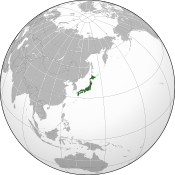Estimated 300-ton radioactive leak at Fukushima rated 'serious incident' by watchdog
Thursday, August 29, 2013
Japan's nuclear watchdog, the Nuclear Regulation Authority, yesterday said the revealed leaking of an estimated 300 metric tons of radioactive water at the damaged Fukushima Nuclear Power Plant was a "serious incident", level three on the seven-part international scale.

Image: Sodacan.
Tokyo Electric Power Company (TEPCO), who run the plant, announced the leak last week and the new accident's level-three rating was made after consultation with the International Atomic Energy Agency. However, the Nuclear Regulation Authority notes this estimate may be overstated as it relies on the leaking tank being full before the leak began.
There is no gauge to measure water quantities inside the tank, used to store contaminated water after the initial accident. Water is being collected at a rate of 400 tons per day, and an unknown quantity of radioactive groundwater is flowing into the sea.
Industry minister Toshimitsu Motegi has already announced increased governmental supervision of TEPCO's leak mitigation after two other leaks this year. Motegi said TEPCO's antileak methods were like "whack-a-mole". Nuclear Regulation Authority disaster taskforce leader Shinji Kinjo has said TEPCO fails to document inspections and is poor at monitoring the tanks on the site. TEPCO staff had said water levels in the tank had remained constant.
Shunichi Tanaka, head of the Nuclear Regulation Authority, said "We have no idea whether it's actually 300 tons that leaked. We need to look into this issue more." TEPCO initially said the leak was small when it was found in July and the watchdog gave it a level one "anomaly" rating at the time. Inspectors now say radiation below this tank stands at 100 millisieverts per hour, and another at the facility has a level of 70 millisieverts per hour.
"One hundred millisieverts per hour is equivalent to the limit for accumulated exposure over five years for nuclear workers; so it can be said that we found a radiation level strong enough to give someone a five-year dose of radiation within one hour," said TEPCO boss Masayuki Ono last week. TEPCO shares dropped yesterday by 2.6% to 497 yen.
Sources
- Jacob Adelman and Yuji Okada. "Japan Nuclear Watchdog Casts Doubt on Tepco Tank Monitoring" — Bloomberg News, August 29, 2013
- Connor Simpson. "Latest Fukushima Leaks Prompt Grim Assessment from Nuclear Agencies" — The Atlantic Wire, August 28, 2013

